The amendment, approved by Czech President Peter Pavel, significantly increases recruitment and retention benefits for Czech soldiers in a bid to address critical army staffing shortages.
Czech President Petr Pavel has signed a key amendment aimed at strengthening the Czech Army by significantly increasing recruitment and retention benefits for professional soldiers. The move, backed by the government, seeks to address the increasingly concerning personnel shortfall in the armed forces.
Under the new legislation, the recruitment allowance for new soldiers will rise sharply to a maximum of CZK 1 million, quadrupling the previous ceiling of CZK 250,000. This allowance will be paid out as a one-time bonus, but only after the completion of a three-month probationary period.
In addition to the recruitment incentive, the amendment enhances several other benefits, including the stabilization allowance, housing support, and subsidies for service abroad. The Czech defense ministry estimates that the additional measures will cost the state budget CZK 375 million annually.
Defense Minister Jana Černochová and Chief of the General Staff Karel Řehka have consistently raised concerns over the army’s personnel shortage. Řehka has stressed that to meet strategic defense goals, the military needs a net annual increase of 1,200 soldiers.
Just 27,826 professional soldiers and 4,266 reservists were reportedly on the military’s books at the beginning of last year, according to the Czech defense ministry. However, Řehka noted that only around 24,000 soldiers are actively serving.
Czech news outlet Echo24 reported on the military’s long-term ambition to grow its forces to 30,000 professional troops and 10,000 reservists by 2030.
Moreover, new NATO alliance requirements suggest that Czechia may need up to 37,500 soldiers to meet collective defence objectives.
The bill also updates the eligibility criteria for enlistment, reaffirming that recruits must have a clean criminal record. It reintroduces the principle of recognizing expunged convictions for most crimes, though individuals convicted of particularly serious offenses or those stripped of military rank remain barred from service.
Lastly, the amendment includes a new provision requiring soldiers to inform their superiors of travel to non-EU and non-NATO countries — designed to help prevent security risks.
Despite attempts to incentivize its citizens and boost military numbers, a survey published last month revealed that only a small fraction would volunteer to join the military if Czechia or a NATO ally were attacked.
The poll, conducted last month by the Median agency for Czech Radio, found just 6 percent said they would definitely sign up to defend the country from attack, while 14 percent said they would consider it.
A new study has confirmed what many have already suspected—drug use in the Czech Republic is increasing.
According to wastewater analysis conducted by the TG Masaryk Water Research Institute (VÚV), cocaine is the most common drug in Prague and Pilsen.
At the same time, methamphetamine (pervitin) dominates in Ústí nad Labem and Ostrava. The study also found that marijuana use is rising, with its presence in public spaces becoming more visible, particularly in Prague.
Gone are the days when smoking a joint was done in secret; today, the scent of marijuana is replacing cigarette smoke on the streets of the capital. However, how do scientists identify which drugs are being consumed and where? The solution was discovered in the wastewater analysis—novel, anonymous, and highly accurate for gazing at national drug consumption patterns.
How Scientists Track Drug Use Through Wastewater
Each year, researchers take wastewater samples from large Czech cities and test them for traces of drugs. It is a straightforward, objective way to see what people are using. The data is then sent to the European Union Drugs Agency (EUDA), allowing comparisons with other countries.
“The method provides an objective and anonymous view of drug consumption in the population. Thanks to it, we know which substances are the most popular and where their use is most widespread,” explains Věra Očenášková, the project leader at VÚV.
However, why don’t scientists sample unknown wastewater in one day? The reason is that people’s behaviour is different during the week. Friday and Saturday nights are party nights, and Mondays are recovery and sleep days. Scientists sample wastewater throughout a week to determine the best estimate of drug use.
The collected samples are then analysed using a liquid chromatograph – a state-of-the-art device worth CZK 15 million.
This device can accurately detect what substances have flowed through the city’s sewers. One analysis takes about two hours and provides a detailed overview of the presence of various drugs.
Drug map of the Czech Republic
In Prague alone, several kilograms of cocaine are flushed down the drain every week—equivalent to hundreds of thousands of individual doses. Addiction specialist Michal Miovský believes this information is crucial for law enforcement and public health efforts.
“Based on this data, authorities can determine where drug trafficking is most active and where prevention efforts should be focused,” he explains.
Prague remains the epicentre of cocaine use, but high concentrations were also found in Pilsen, Brno, and České Budějovice.
Marijuana is the most prevalent and accepted substance in the Czech Republic. “Marijuana stays in the body for a long time, which is why its levels tend to be high in wastewater,” explains Kateřina Grohmannová from the National Drug Monitoring Centre.
The highest levels of marijuana use were recorded in České Budějovice, Pilsen, and Prague, though significant concentrations were also found in Brno, Karlovy Vary, Ostrava, and Ústí nad Labem. According to experts, marijuana popularity is universal among generations, with no change in consumption patterns over time.
Ketamine is increasing, particularly in Prague, Ústí nad Labem, Brno, and Pilsen. The increasing trend of ketamine is something to worry about because the abuse of the drug has severe health implications. The death of actor Matthew Perry, in which ketamine was involved, has put its risks in the spotlight again.
Pervitin: The Czech Republic’s Long-Standing Meth Problem
Pervitin has long been a significant issue in the Czech Republic. It remains most common in Ústí nad Labem and Ostrava, regions that face significant socio-economic difficulties. The drug’s low price and easy availability make it particularly appealing.
Three years ago, pervitin was even detected in wastewater samples taken from schools in the Chomutov region, indicating that children under the age of 15 are experimenting with the drug. The study also found high levels of pervitin use in Pilsen, České Budějovice, and Brno.
Ecstasy: The Weekend Party Drug
Ecstasy (MDMA) remains a favourite among partygoers, with the highest levels found in Prague and Ostrava, followed by Pilsen, Brno, and České Budějovice. Unlike other drugs, ecstasy use is seasonal and peaks on weekends, which is reflected in the wastewater data—concentrations of MDMA spike on Fridays and Saturdays, then drop significantly during the week.
Would you like us to write about your business? Find out more
National park Bohemian Switzerland is a great hiking destination. You might have already heard about Pravčická Gate or iconic viewpoints around Jetřichovice.
If you decide to explore more about this hiking paradise, you need quality accommodation. I tried several pensions in this area, but I can recommend only one – Krásná samota. It means “beautiful solitude,” and once you visit this place, you understand why.
Bohemian Switzerland is my favorite place where I like to take my foreign friends for hiking. Our main destination is usually a hiking trek to Pravčická gate, unique stone formation in Europe.
However, I always had an issue finding appropriate accommodation that would allow us to stay for several days and explore the area more. Don’t take me wrong, there are some hotels in Hřensko or pensions in typical Czech cottages, but there was always something that I would not completely recommend it. Until I found Krásná Samota, thanks to Amazing Places recommendation.

Two hundred years of history
Despite the fact, that pension is really a solitude outside of the civilization, we found it through villages and forests thanks to well-prepared signs. Once we arrived, we were welcomed by friendly dog Lajla and by Marcela with her little daughter Magdalenka. Michal just had a yoga lesson in the attic. Marcela showed us our double room, breakfast area with a fireplace, and a huge garden. It was about sunset time, and I could not help myself and start photographing, it was just magical.
Pension used to be a farmhouse founded in 1818. However, it deteriorated over time, especially during the communist period when private farming was prohibited. In 2013, Michal found this place and started with reconstruction. The whole building is made of natural materials such as wood, sandstone, and clay plasters.
During five years of reconstruction, Michal combined it with his regular job as a hairdresser. Today, he is not pursuing a professional career anymore, and rather enjoys life in the countryside. However, you can still take advantage of his professionalism and have a new haircut.
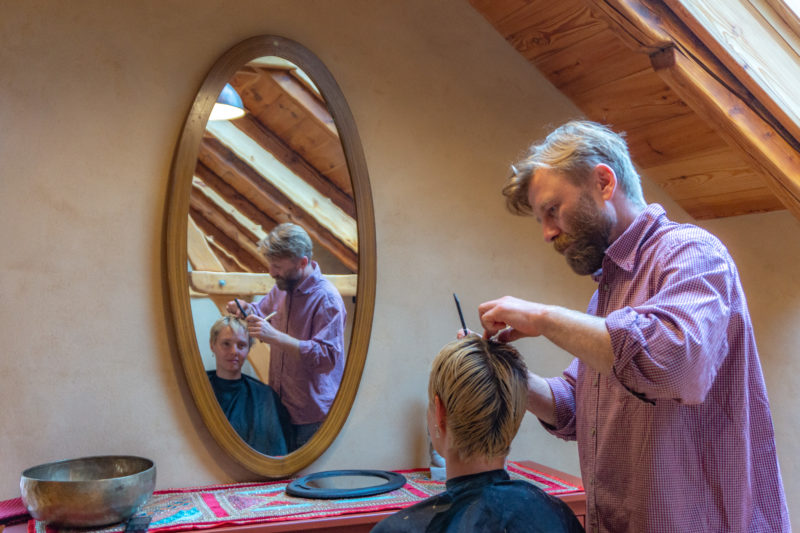
Krásná samota was finally open in 2018 when Michal and Marcela had a one-year-old girl Magdalenka. If you are wondering how they come up with this suitable name, the responsible one is the little one. Although she was not speaking at this time, she brought a book with this name at the moment when her parents were discussing the name. And here it is, the beautiful solitude.
Today, you can find accommodation in one double room or three apartments, each one with a private kitchen and bathroom. You can prepare food by yourself or have a vegetarian breakfast by the fireplace downstairs. The pension can accommodate up to 17 people.
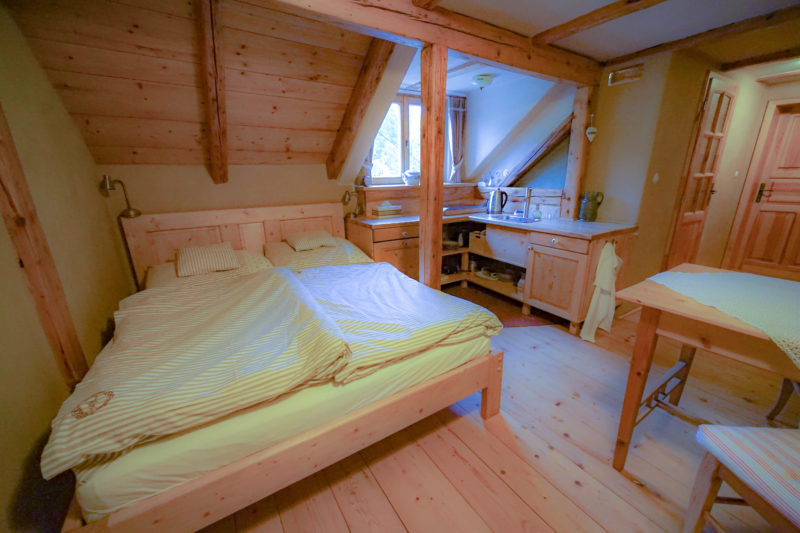
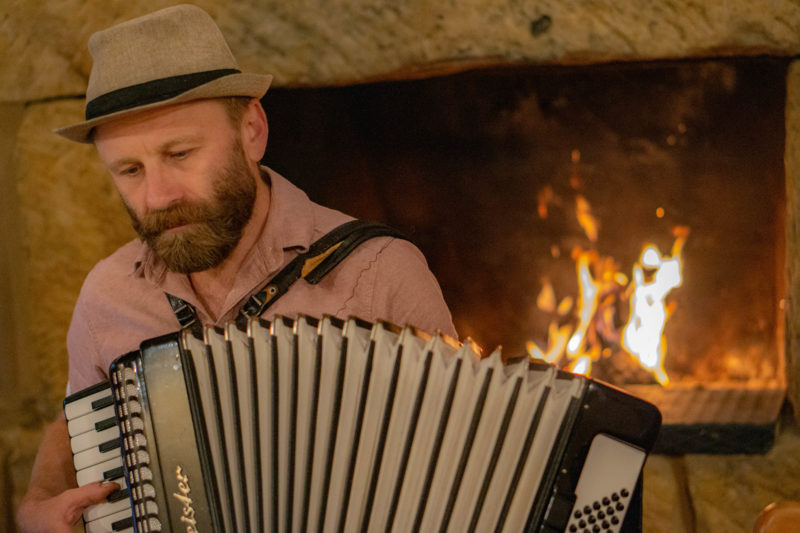
What you can do and see at Krásná samota
The pension itself is a great place for relaxation. You can explore the garden with growing flowers and vegetables, range with sheep and goats, fireplace under the stars, grill place under the shelter or hammock under the trees. In the middle of the garden is a pond with various fishes. Close by; you can even find a beehive thanks to which Michal can provide you, with homemade honey.
During the winter, the garden is still charming, but you can take advantage of the fireplace and choice of local wines, have a yoga lesson with Michal, enjoy the sauna with wellness and massages or relax with your book, anywhere you like.
Therefore, Krásná samota is a great place to relax and active holiday for the whole year. I would highly recommend hiking to Pravčická brána (about 30-minute drive to Hřensko) and hiking to viewpoints around Jetřichovice (about 20 min drive). Pension is a great starting point for bikers and cross-country skiers. If you prefer just a relaxing walk, the nearby village Chřibská is full of charming timbered houses.
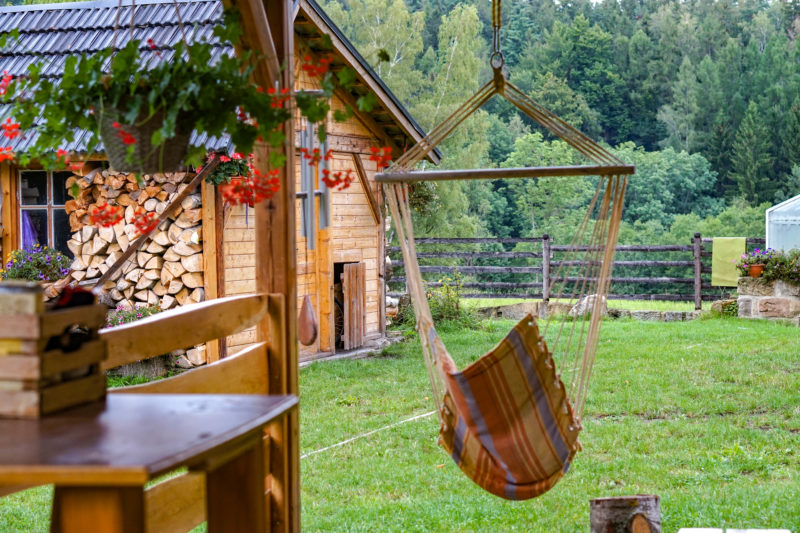
How to get to Krásná Samota
You can drive to Chřibská by highway direction to Dresden and then turn North to Česká Kamenice and village Chřibská. It is about 2 hours drive. In Chřibská, you can find several signs on the way that will take you through the forest to Beautiful Solitude…
Address: Horní Chřibská 84, Chřibská, 407 44
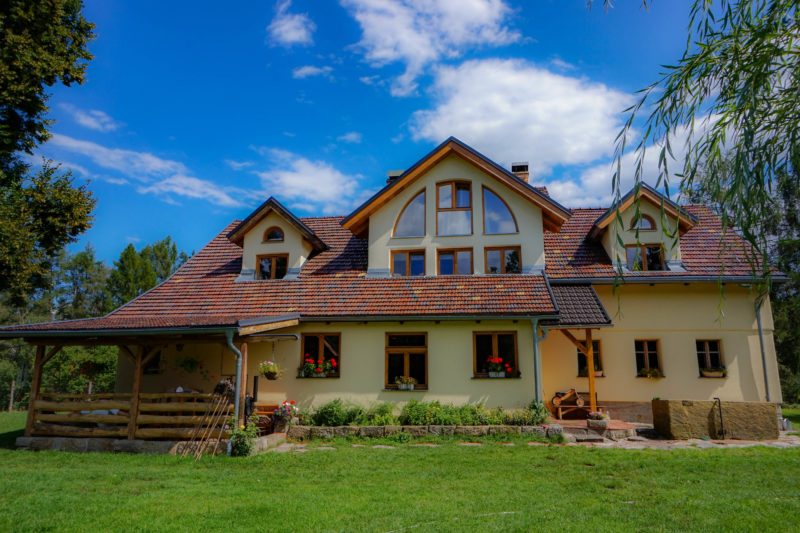
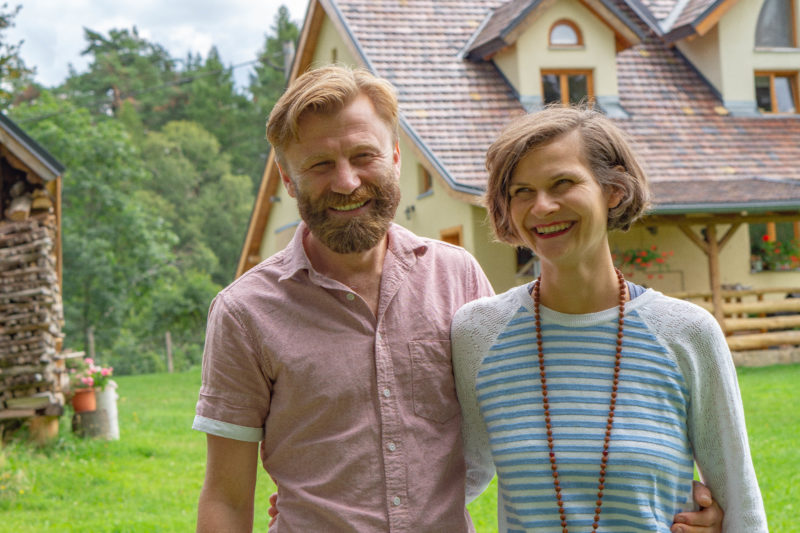
January 16 marks exactly 55 years since Czech student Jan Palach’s self-immolation at the top of Wenceslas Square that would lead to his death in hospital three days later.
Memorial events were held in Prague on Tuesday marking the self-immolation of Jan Palach 55 years ago, on January 16, 1969. Senate speaker Miloš Vystrčil and other senators laid a wreath at a memorial at the top of Wenceslas Square, where Palach, who was 20, set himself on fire in protest at apathy in the face of the Soviet occupation of Czechoslovakia.
About half-past one, Jan Palach doused himself in petrol and set himself on fire near the fountain at the National Museum in Wenceslas Square in Prague. After several minutes, those passing managed to extinguish the living torch.
The seriously burnt student was taken to the Faculty Hospital in Vinohrady, but the injuries were so serious that he had no hope of surviving.
He left a letter at the site explaining the motives of his terrible act: “As our nation is living in a desperate situation, and its reconciliation with fate has reached its utmost stage, we have decided that in this way we will express our protest and shake the conscience of the nation …ˮ He died three days later, on 19 January 1969.

Palach called himself “Torch no. 1” in his letter, giving the impression that he was a part of a larger group which in fact did not exist. But several others followed his example in Czechoslovakia and other eastern bloc countries.
“People must fight against the evil they feel equal to measure up to at that moment,” Palach said before he died in hospital on Jan. 19.
Palach’s death did not change the gradual, almost total resignation in the Czechoslovak Socialist Republic. For almost twenty years, the name Jan Palach could only be whispered in public.
His life story immediately got into “forbidden” songs or strongroom literary works. Only after a change in relations in the autumn of 1989 could historians, documentarists or artists officially and freely present it.
Palach was not the only person to protest via self-immolation. Student Jan Zajíc followed on Feb. 25, 1969, also on Wenceslas Square. In April in the town of Jihlava, Evžen Plocek set himself on fire, though this was less publicized.

A memorial bronze cross on a small rise in the sidewalk is in front of the National Museum on Wenceslas Square.
There is a square in Prague named after Palach, náměstí Jana Palacha, where the Rudolfinum concert hall; Academy of Arts, Architecture and Design in Prague (VŠUP); Museum of Decorative Arts In Prague (UPM); and Philosophical Faculty of Charles University are located.
There are also streets and places named after him in other Czech towns, as well as in Luxembourg, France, Italy, the Netherlands, Poland, and Bulgaria.
Embers of change
Jan Palach did not die in vain. Two decades later, a group called the Movement of the Children of Bohemia — a self-described “monarchist-anarchist” initiative — took inspiration from his activism and called for new protests.
These activists, like the thousands of others who would prove crucial to putting an end to Soviet rule in Czechslovakia, had been children when Palach set fire to himself in 1969. But on January 15, 1989, they took to Prague’s Wenceslas Square to commemorate his incredible protest and the sacrifice he had made.
They flocked to the square every day for a week, in what later became known as “Palach Week
The Czech Republic is imposing a new series of restrictive measures in response to a record surge in coronavirus infections.
From midnight on October 14, all restaurants, bars, and clubs will be closed until the end of the emergency. Takeaway orders will still be available until 8 p.m.
Furthermore, all schools will be closed until November 1, with the exception of schools for the children of doctors, nurses, and rescue workers. Kindergartens will remain open.
Citizens need to wear face masks at public transport stops. A maximum of six people can gather in public and a ban on drinking alcohol in public spaces has also been put in place.
“If the average reproduction number per week will be reduced to 0.8, the measures taken today will be relaxed,” added Babiš.
“We see that the growing trend has the same parameters as other countries such as Israel or the United Kingdom, where there has been the introduction of comprehensive measures. We have to do it, we have no other chance,” said Prymula, adding that “we must change the trend, otherwise the capacity of hospitals will be filled”.
A 30-day state of emergency has been implemented on October 5.
There was a new record high of 8,618 confirmed COVID-19 cases on Friday, marking the fourth straight day last week of a new record for single-day coronavirus infections.
Government data shows the Czech Republic has had 119,007 confirmed cases with 1,045 deaths, on Monday. Of them, 256 people died last week.
Po jednání vlády jsou přijata tato opatření. pic.twitter.com/PNp2Rr9eIL
— Roman Prymula (@profesorPrymula) October 12, 2020
Po jednání vlády jsou přijata tato opatření. pic.twitter.com/PNp2Rr9eIL
— Roman Prymula (@profesorPrymula) October 12, 2020
The Czech Republic and Tunisia have been added to Malta’s amber travel restriction list.
From Friday 28 August at midnight, every person arriving in Malta needs to produce a negative COVID-19 swab test 72 hours before arriving in Malta or else be subject to random testing upon arrival.
Passengers who fail to present the certificate will be made to take a swab test at the Malta airport and could be asked to remain in quarantine.
The Czech Republic and Tunisia join Bulgaria, Romania, and parts of Spain who are also on the amber list.
38 new cases of COVID-19 have been registered overnight in Malta, according to the latest figures released by the Health Ministry.
Since the start of the pandemic in March, 1,029 people have recovered from the virus and ten patients have died.
- If you are looking for a job in Prague, check our new job section here
- Time to move to a new flat? Rents with no commission here!
- Want to advertise your business on Prague Morning? Contact us at info@praguemorning.cz
The Czech authorities recorded 506 new coronavirus cases on Friday, the highest number of new infections in one day since the outbreak began.
Czechia has so far reported 21,551 confirmed cases of the virus, with 411 deaths, including 19 over the past week.
The Czech government was among the first in Europe to introduce curbs on movement and business as the outbreak took hold. It began to lift restrictions since May but has reintroduced some measures as cases rose in recent weeks.
Face masks will once more be compulsory on public transport, at health and social care facilities, and in state office buildings from Sept 1, but the government rowed back on a requirement to wear masks in shops, restaurants, and common areas of schools.
Outdoor public events including soccer, which start new league season this week, may be attended by up to 5,000 people, if separated into sections of 1,000, and indoor events can host up to 5,000 in separate sections of 500.
The government plans to further relax restrictions on public events from September.
- If you are looking for a job in Prague, check our new job section here
- Time to move to a new flat? Rents with no commission here!
- Want to advertise your business on Prague Morning? Contact us at info@praguemorning.cz
The first stalls selling burčák appeared on Thursday in several towns in South Moravia. Mr. Miloslav Machuča from Valtice, who grows grapes almost exclusively for the burčák production, was one of the first to start selling the sweet young Czech wine.
Burčák is made of grapes harvested and squeezed just a few weeks ahead and constantly fermenting. It’s basically the first stage in wine production.
Burčák must be stored carefully to prevent explosions. CO2 gas forms as the wine ferments, so it’s best stored upright with the cap loose enough for the gas to escape. It should also be consumed within a day or two of buying to ensure peak flavor.
This alcoholic wine drink is produced when the pressed grape juice is partially fermented. Its consumption is typically connected with the first autumn days.
Laws about burčák
The Czech law allows the sale of “burčák” starting August 1.
Burčák can only be produced using grapes grown and processed in the Czech Republic, and can only be sold between August 1st and November 30th. The grapes must also be from the current year’s harvest. Burčák cannot be diluted in any way by the seller, and consumers must be informed that they are purchasing half-fermented wine and where it comes from.
Where to get it
To enjoy a fresh glass of Burčák in Prague, one can take part in popular wine festivals called Vinobraní. There is a number of festivals celebrating the wine harvest, where locals like to enjoy a cup of Burčák accompanied by live music, entertainment, and traditional Czech food.
The most popular one is festival Vinobraní Grébovka, which will take place on Friday, September 20 on Náměstí Míru from 2 pm, and will continue throughout Saturday, September 21 in Havlíčkovy sady from 2 pm till 10 pm.
It is very common that this drink is sold in plastic bottles with a practical handle lifter (1,5 l). You can buy it only at farmers’ markets, in wine bars or in the streets.
- If you are looking for a job in Prague, check our new job section here
- Time to move to a new flat? Rents with no commission here!
- Want to advertise your business on Prague Morning? Contact us at info@praguemorning.cz
While Poland has the highest levels of air pollution in Europe, according to the newly released Air Quality Life Index – an international ranking that charts air quality around the world – it also had the most to gain if pollution levels were reduced.
According to the study, the most polluted countries on the continent are generally in Eastern and Central Europe, with Belarus, Slovakia, Czech Republic, Slovenia, Hungary, Lithuania, and Latvia also high up the index.
When it comes to individual regions, the report finds that the most polluted are Moravskoslezský in the Czech Republic, Borsod-Abaúj-Zemplén in Hungary, Košický in Slovakia, and Warsaw in Poland.
The index shows it is not only Eastern Europe that has had life expectancy affected by air pollution.
“Though the threat of coronavirus is grave and deserves every bit of the attention it is receiving—perhaps more in some places—embracing the seriousness of air pollution with a similar vigor would allow billions of people around the world to lead longer and healthier lives,” says Michael Greenstone, a professor in economics at the University of Chicago and the director of the Energy Policy Institute at the University of Chicago (EPIC).
Areas of northern Italy, particularly the Po Valley, which includes Milan, scored particularly badly – in 2018, Italy’s industrial capital was behind only Warsaw for concentrated levels of PM2.5, the particles that scientists look at to measure air quality.
And despite most countries meeting the EU’s air pollution standard of 25 μg/m³, the Air Quality Life Index shows that nearly three-quarters of Europe’s population reportedly live in areas that fall short of the WHO’s guideline.
In spite of the warning, the study reports Europe’s response to air pollution over the past two decades has in general been a success story: on average, Europeans are exposed to 41 percent less particulate pollution today than they were 20 years ago, increasing life expectancy by nine months across the board.
An especially poignant example comes from China, where the country began a “war against pollution” in 2013. Since then, three-quarters of the world’s reductions in pollution have come from China. The country has reduced particulate pollution by nearly 40%.
“The legacy of environmental improvement in much of Europe over the last two decades is evidence that people living in today’s pollution hot spots can see brighter skies,” says Greenstone.
“A demand for change from citizens and subsequent strong policies have helped to clear the air in parts of Europe before and can continue to do so to ensure that high pollution today does not need to be tomorrow’s fate.”
- If you are looking for a job in Prague, check our new job section here
- Time to move to a new flat? Rents with no commission here!
- Want to advertise your business on Prague Morning? Contact us at info@praguemorning.cz
Three countries have decided to tighten measures for Czech citizens due to the epidemiological situation in the Czech Republic as the daily increase in coronavirus cases in recent weeks is about 200, much more than at the beginning of July.
During Thursday night, Slovenia became the latest country to change the rules for Czechs and, suddenly, put the Czech Republic on the list of medium-risk countries.
Upon entering the country, a two-week quarantine is mandatory for Czech citizens. If they only need to pass through the country, this restriction does not apply to them, but the transit must not exceed 12 hours, the Czech Ministry of Foreign Affairs stated on its website.
On Thursday, Norway also imposed restrictions on the Czechs – they have to spend ten days in quarantine after entering the Scandinavian country. Oslo placed Czechia on the traffic-light system “red” list together with France, Switzerland, and Monaco. Norwegians are also advised to travel to these four countries only when necessary.
Currently, Norway allows free travel to people from countries that have registered less than 20 coronavirus cases per 100,000 population in the last two weeks, which is not the case for the Czech Republic.
This week, Ukraine also decided to include Czechia among countries with an unfavorable epidemiological situation. Thus, upon their arrival in Ukraine, Czechs have to submit a negative coronavirus test or stay in quarantine.
- If you are looking for a job in Prague, check our new job section here
- Time to move to a new flat? Rents with no commission here!
- Want to advertise your business on Prague Morning? Contact us at info@praguemorning.cz
The Czech brewing industry recorded a loss of over CZK 4.7bn (€ 179mn) from March to May due to the coronavirus (COVID-19) and related government measures, as stated in a study conducted by the Center for Economic and Market Analysis (CETA), published on July 28.
The most negatively affected were restaurants and bars, which were forced to close overnight. Beer sales in this segment decreased by 55% (728,000 hectoliters) between March and May.
The losses of the breweries in terms of sales exceeded CZK 1.104mn. Sales of bottled beer, which was sold more in stores, increased by about CZK 794mn.
“The hospitality and beer industries suffered significant losses during the coronavirus crisis. Most pubs reopened in June, but the coming weeks will decide whether they survive. The most critical situation is in Prague, Karlovy Vary, and other localities dependent on tourism,” said executive director of the Czech Association of Breweries and Malthouses Martina Ferencova, quoted by the Czech News Agency.
“For the next period, it will be crucial for the government to continue to support the most affected sectors, including the hospitality industry, and at the same time not burden them with new administrative and regulatory measures,” Ferencova stressed.
In connection with possible concerns about the second wave of the coronavirus pandemic, restaurants fear further possible closures and further losses.
“Although the pubs and restaurants are open, we definitely have not won. Demand is still subdued in many places, while costs are returning to their original levels. Especially in tourist locations, restaurants need help as well as hotels and spas. Following the example of the tourism agenda, also the National Gastronomy Support Program should be established. With a clear agenda and action plan,” said co-founder of the Hospodska restaurant group Lubos Kastner.
- If you are looking for a job in Prague, check our new job section here
- Time to move to a new flat? Rents with no commission here!
- Want to advertise your business on Prague Morning? Contact us at info@praguemorning.cz
Two thousand people have been gathering from Friday night at a techno party at Hlaváček Lhota (Benešov region).
“The open-air event is being held on private property with the owner’s consent”, said police spokeswoman Lucie Nováková, “so it cannot be considered illegal.”
Techno lovers are being closely monitored by the police.
According to Nováková, the party started on Friday evening. “Since Friday evening, Central Bohemian police officers have been monitoring the place, directing traffic on the driveways,” added Nováková.
More than half of the participants left today afternoon. According to the police, about 800 people are still raving, a quarter of them are foreigners.
“The place is also monitored by a helicopter of the Czech Police Aviation. Until now, police officers have not had to deal with any serious disturbances of public order,” said the police spokeswoman.
According to Lenka Sladkovská, mayor of Ješetice, the situation is very unpleasant. “I’m dealing with the situation here, but I’m not going to give any interviews at the moment.”
Events may still be organized with up to five sectors with 500 capacity each, technically raising the limit to 2,500. The sectors must be completely separated from each other, including a separate entrance. Outdoor events will be limited to 1,000 people.
The Czech Republic reported 281 cases of the new coronavirus on Friday, the largest one-day increase since the end of June, bringing the country’s total to 15,081.
From Monday, July 27, the public will be required also to wear a face mask in pharmacies and medical facilities, “where it is not always possible to maintain a two-meter distance from other people”, the Czech government said in an update on its website. Masks will not be compulsory on trams, trains, or in shopping centers.
Stř. Čechy: Policisté monitorují od pátečního večera průběh technopárty na Benešovsku s využitím Letecké služby PČR. Zatím klidný průběh bez narušení veřejného pořádku. Podrobné informace zde: https://t.co/w7k093bLm3 #policiestc pic.twitter.com/3LG7mUVnPv
— Policie ČR (@PolicieCZ) July 25, 2020

Photo: Policie CR

Photo: Policie CR

Photo: Policie CR
- If you are looking for a job in Prague, check our new job section here
- Time to move to a new flat? Rents with no commission here!
- Want to advertise your business on Prague Morning? Contact us at info@praguemorning.cz
